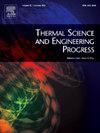Artificial intelligence and robots promote energy management and financial cost optimization in hybrid manufacturing enterprises
IF 5.1
3区 工程技术
Q2 ENERGY & FUELS
引用次数: 0
Abstract
Against the backdrop of global environmental pressures and energy shortages, mixed manufacturing enterprises are facing a dual challenge of improving energy efficiency and reducing production costs. Currently, many enterprises are seeking to achieve more efficient production and management through automation and intelligent means. The aim of this study is to construct a comprehensive model that optimizes the energy management and financial costs of hybrid manufacturing enterprises through industrial robots and artificial intelligence technology, enhancing their economic benefits and market competitiveness. This article reviews relevant work and analyzes the application of industrial robots in the manufacturing process, including modeling of robotic arm motion, machining scheduling, and manufacturing reliability. Subsequently, an energy management model based on thermal science was designed and its effectiveness was evaluated, combined with energy-saving diagnostic tools to assess the actual effectiveness of energy management. Finally, how artificial intelligence technology can optimize financial costs was discussed, and a series of specific optimization strategies were proposed. Research has found that by applying advanced robotic arm motion modeling technology and intelligent scheduling algorithms, hybrid manufacturing enterprises can significantly improve production efficiency and reduce energy consumption. The designed energy management model effectively evaluates the energy usage of enterprises and improves energy utilization efficiency through energy-saving diagnostic measures. By combining artificial intelligence with financial cost optimization strategies, the financial performance of enterprises has also been significantly improved.
求助全文
约1分钟内获得全文
求助全文
来源期刊

Thermal Science and Engineering Progress
Chemical Engineering-Fluid Flow and Transfer Processes
CiteScore
7.20
自引率
10.40%
发文量
327
审稿时长
41 days
期刊介绍:
Thermal Science and Engineering Progress (TSEP) publishes original, high-quality research articles that span activities ranging from fundamental scientific research and discussion of the more controversial thermodynamic theories, to developments in thermal engineering that are in many instances examples of the way scientists and engineers are addressing the challenges facing a growing population – smart cities and global warming – maximising thermodynamic efficiencies and minimising all heat losses. It is intended that these will be of current relevance and interest to industry, academia and other practitioners. It is evident that many specialised journals in thermal and, to some extent, in fluid disciplines tend to focus on topics that can be classified as fundamental in nature, or are ‘applied’ and near-market. Thermal Science and Engineering Progress will bridge the gap between these two areas, allowing authors to make an easy choice, should they or a journal editor feel that their papers are ‘out of scope’ when considering other journals. The range of topics covered by Thermal Science and Engineering Progress addresses the rapid rate of development being made in thermal transfer processes as they affect traditional fields, and important growth in the topical research areas of aerospace, thermal biological and medical systems, electronics and nano-technologies, renewable energy systems, food production (including agriculture), and the need to minimise man-made thermal impacts on climate change. Review articles on appropriate topics for TSEP are encouraged, although until TSEP is fully established, these will be limited in number. Before submitting such articles, please contact one of the Editors, or a member of the Editorial Advisory Board with an outline of your proposal and your expertise in the area of your review.
 求助内容:
求助内容: 应助结果提醒方式:
应助结果提醒方式:


